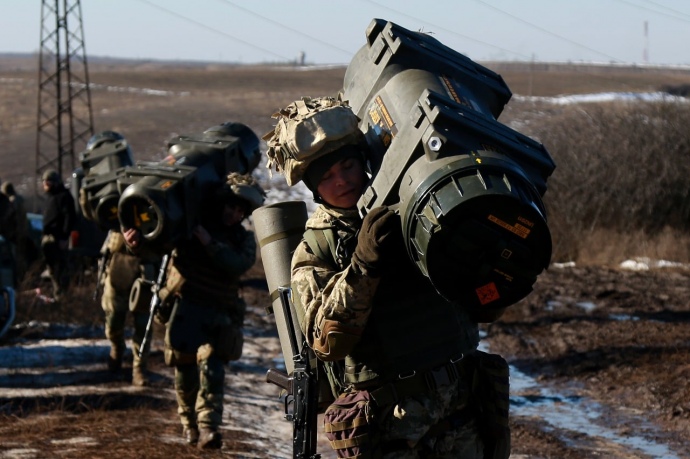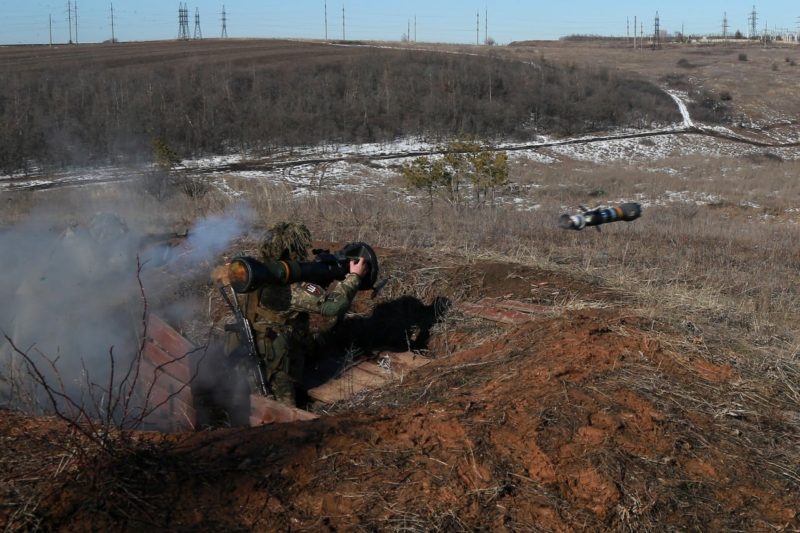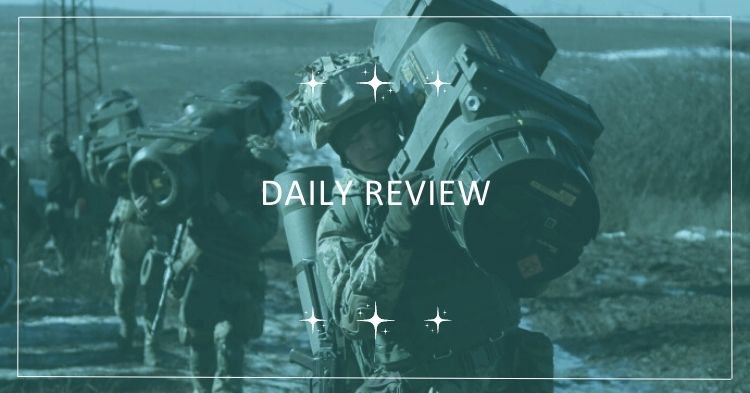Past 24 hours in the war zone
- On 15 February, Russian hybrid forces launched four attacks on Ukrainian positions in Donetsk, Luhansk, and Mariupol sectors, including heavy artillery and weapons, banned by Minsk accords, Ukraine’s Joint-Forces Operation Staff (JFO) reported.
- As of 19:30 Feb 14, OSCE’s Special Monitoring Mission recorded 17 violations in the Donbas region, including one explosion in Donetsk Oblast; 157 violations, including 40 explosions in Luhansk Oblast.
Flash Ukraine news
- US President Joe Biden said Russia’s further advance into Ukraine “remains distinctly possible,” but a diplomatic solution is still possible.
- French President Emmanuel Macron urged Putin not to recognize illegal self-styled “people’s republics” in the occupied Donbas.
- Ukraine has asked NATO to provide international assistance in case of major emergencies of “various nature” that may affect the civilian population: truck cranes, crawler bulldozers, pneumatic wheel excavators, truck tractors, all-wheel-drive trucks, pickups, off-road vehicles, mechanical demining machines, etc.
- Ukrainian military conducted a live-fire exercise involving NLAW anti-tank missile systems and M-141 grenade launchers in Donetsk Oblast, according to the JFO. The soldiers performed the initial exercise of firing at stationary targets using the weapons that Ukraine had received from the UK and the US.


NATO, US, Ukraine question Russia’s claimed troop pullback from Ukraine borders
Despite the Kremlin’s statements that Russia has started partial withdrawal of its troops from around Ukraine, the US, NATO, and Ukrainian officials remain skeptical about the Russian claims.
- On 16 February briefing, NATO Secretary-General Jens Stoltenberg said that Russian buildup near Ukrainian borders continues, despite Moscow’s claims that Russia had begun withdrawing some of its military units. US State Secretary
- Antony Blinken also said that Russia continues to threaten Ukraine with troops and weapons massed near the country’s borders, reinforcing the EU and NATO’s skepticism over the Kremlin’s claims to have withdrawn some forces.
- Ukrainian FM Dmytro Kuleba says that “statements on withdrawal aren’t sufficient” and that Ukraine demands transparency from Russia, urging it to use “OSCE tools to defuse tensions.”
NATO, US, Ukraine question Russian claims of troop pullback from Ukraine borders
EU Parliament approves €1.2 billion loan to Ukraine
The EU Parliament agreed to a Commission proposal to provide Kyiv with macro-financial assistance, an emergency resource for EU neighbourhood countries struggling to pay their bills. It will be paid out in two instalments.
Half of the 1.2 billion euro loan can be disbursed immediately to foster stability in Ukraine, if certain preconditions are met.
The loan serves as “swift support in a situation of acute crisis and to strengthen the resilience of the country”, the proposal states. In order for the money to be disbursed, the country must show progress in implementing a macroeconomic programme set up by the International Monetary Fund (IMF). MEPs emphasize that “effective democratic mechanisms, including a multi-party parliamentary system, and the rule of law, and guarantees respect for human rights” are also preconditions for disbursement.
Day of Unity
Today Ukraine marked a one-time holiday called the Day of Unity, declared by President Zelenskyy’s decree of 14 February. The decree doesn’t make the Day an annual occasion and specifies that it would be marked only on 16 February 2022, the day earlier mentioned by US President Biden as a day of a possible Russian invasion. The holiday was declared to bolster public resolve,
“to strengthen the consolidation of Ukrainian society, strengthen its resilience in the face of growing hybrid threats,” as Zelenskyy’s decree puts it.
Marking the Day, national TV channels run a TV marathon featuring Ukrainian top officials, Volodymyr Zelenskyy partook in the hoisting of the national flag, a 200 meter-long flag was carried through Kyiv’s Olympic stadium, Western ambassadors laid flowers at a wall in Kyiv, commemorating those who perished since 2014 in the Russo-Ukrainian war. Later, the Ukrainian president with EU Ambassador Matti Maasikas and ambassadors of EU countries to Ukraine flew to the front-line port-city of Mariupol to take part in the Day of Unity’s festivities.
@ZelenskyyUa @MattiMaasikas #EU Ambassadors visit #Mariupol, #Ukrainian frontier city in #Donetsk region, to mark #UnityDay #StandWithUkraine #DayOfUnity pic.twitter.com/EVCVxzcxjX
— UATV English (@UATV_en) February 16, 2022
The name of the newly-declared holiday may confuse the Western audience because Ukraine has another Unity Day celebrated on 22 January to commemorate the declaration of unification of the Ukrainian National Republic and the West Ukrainian National Republic in 1919.
However, the Unity Day of 22 January is called Den’ Sobornosti in Ukrainian, which refers to the country’s unity or indivisibility. Meanwhile, the new Unity Day – Den’ Yednannia – refers to the close connection or cohesion among the people.
Russia sentences RFE/RL freelancer to six years in first case of torture of professional journalist in Crimea
Evidence in his case is manifestly incompetent. According to Yesypenko, the FSB planted a grenade in his car and tortured him into self-incriminating testimony.
This is the first time that a professional journalist has been subjected to torture in occupied Crimea to extract testimony.
Ukraine continues pressuring Russia through OSCE channels
Ukraine’s Foreign Minister Dmytro Kuleba informed that Ukraine now requests a joint meeting of the Permanent Council and the Forum for Security Co-operation of OSCE within 48 hours to elaborate on further steps regarding Russia’s troop buildup near Ukraine. This step is the latest in a series of Ukraine’s diplomatic endeavors to influence Russia through the OSCE mechanisms.
On 13 February, Kuleba told that Russia failed to respond to Ukraine’s request under the Vienna Document, as a result of which Ukraine took the next step — requested a meeting with Russia and all participating states within 48 hours to discuss its reinforcement & redeployment along Ukraine’s border & in temporarily occupied Crimea.
According to the provisions of the Vienna Document, Russia had within 48 hours to provide the exact areas of military activity, to announce the date of its completion, as well as the name, subordination, number of military formations, types of weapons & military equipment involved.
On 15 February, Russia had not attended the meeting convened by Ukraine, as a result of which Ukraine is now seeking a higher-level meeting.
Israel reportedly blocked sale of Iron Dome defense system to Ukraine
Israel halted an attempt by the US to transfer several batteries of the Iron Dome defense system to Ukraine over worries it would damage its relations with Russia, Ynet reported.
Erdoğan continues offering his mediation between Ukraine and Russia
Turkish President Recep Tayyip Erdoğan has once again said that he hopes to arrange a trilateral meeting between the presidents of Ukraine, Türkiye and, Russia in Istanbul or Ankara. Amid the Russian saber-rattling on Ukrainian borders and occupied territories, the Turkish leader keeps offering his mediation at least since December 2021.
“Russia need not invade Ukraine: it already got what it wanted”
Russia need not invade Ukraine: it already got what it wanted
NATO defense ministers discuss Russia, Ukraine
On 16 February, a series of meetings of NATO defense ministers started in Brussels. According to NATO chief Jens Stoltenberg, the ministers met on the first day “to address Russia’s continued military build-up in and around Ukraine.”
The Alliance members have also consulted on how to keep their country’s nuclear deterrent “safe, secure and effective,” according to the Secretary-General.
Putin’s recognition of the “LNR/DNR” independence would mean Russia’s rejection of Minsk agreements: Blinken
US State Secretary Antony Blinken said that if Putin would recognize the non-government-controlled parts of Luhansk and Donetsk oblasts of Ukraine as “independent,” it would mean Russia’s rejection of the Minsk accords.
“The Russian Duma has stated that it plans to send to President Putin an appeal to recognize the so-called Donetsk and Luhansk People’s Republics as ‘independent.’ To be clear: Kremlin approval of this appeal would amount to the Russian government’s wholesale rejection of its commitments under the Minsk agreements, which outline the process for the full political, social, and economic reintegration of those parts of Ukraine’s Donbas region controlled by Russia-led forces and political proxies since 2014,” Blinken said.
Ukrainian officials are of the same opinion, while Russian MPs believed that it wouldn’t undermine the Minsk deal.
Meanwhile, Putin’s press secretary Dmitry Peskov assures that recognizing “LNR/DNR” would not “correlate” with Minsk agreements, and though Putin has “taken note” of the appeal, implementation of Minsk is the main task. Also, he said Russia’s passportization of Donbas residents doesn’t run contrary to Minsk
“Cyber warfare in Ukraine poses a threat to the global system”
In the wake of the massive hack of Ukrainian government websites on 14 January and the 15 February DDoS attack on Ukrainian banks and army websites, Financial Times has published an article by Keith Alexander, former director of the US National Security Agency and founding commander of United States Cyber Command, in which he argues that the cyberattacks on Ukraine could possibly be the part of the first full-scale cyber war in the making.
“Cyber security remains the exposed underbelly of democracies around the world. Ukraine is already facing the cyber-equivalent of a howitzer. We will all be faced with a 9/11-scale threat in cyber space — the question is simply when. Banding together is a must if we are to protect ourselves against one of the greatest risks to a prosperous and peaceful future,” believes Keith Alexander.
Ukrainian banker says “almost all” Ukrainian banks were DDos-attacked on 15 February
Almost all of Ukraine’s banks came under a massive DDoS attack on 15 February, Oleh Horokhovskyi, co-founder of Monobank mobile banking app, wrote on Facebook.
He stressed that the attack had affected almost all banks, but some more badly than others. For example, Ukrainians had no access to electronic banking services of the state-owned Privatbank and OschadBank last afternoon.
Ukrainian e-government portal was under cyber attack again
Ukrainian Minister of Digital Transformation Mykhailo Fedorov said that the Ukrainian e-government portal Diia came under a massive DDoS attack right after similar attacks on Ukrainian banks and the website of the Ministry of Defense on 15 February. According to the minister, the Diia team successfully repulsed this attack, which originated in four countries — Russia, China, the Czech Republic, and Uzbekistan.
“Germany needs an open discussion about arms exports to Ukraine”
Germany sends Ukraine helmets, but won’t supply it with weapons – not even to defend itself. This is what comes of the longstanding refusal to seriously discuss the sensitive issue of arms exports, writes Jens Thurau of DW.
As Euromaidan Press reported earlier, the German military exports to Ukraine have been banned since the times long before the Russian invasion of 2014 and the subsequent war ongoing to this day. Currently, German politicians refer to the German policies to deny arms exports to conflict zones, however, experts mention a number of Germany’s reasons not to arm Ukraine, very different from the country’s most popular official excuse.




